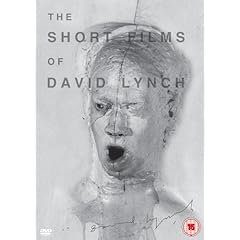Lynch's first film
'My wife Peggy's niece was having a bad dream one night and was saying the alphabet in her sleep in a tormented way. That's sort of what started The Alphabet going. The rest of it was just subconscious.'Over the last week or so, I've been revisiting some of David Lynch's work in television and film. I've watched some Twin Peaks over coffee with my flatmates, and introduced a friend of mine to Eraserhead. But at the same time I've looked into some of Lynch's other work in painting and photography. I'm struck by how the same obsessions recur throughout everything he does: his photographs feature familiar close-ups of industrial machinery, while his paintings portray the same abstracted characteristics of some of his films.
David Lynch, interviewed by Chris Rodley
I've also investigated some of his shorter films, made while he worked as a student at the American Film Institute. The Alphabet struck me as particularly interesting, marking a departure from his early career as a painter as he began exploring the possibilities of images in motion.
One great aspect of The Alphabet is the way it illustrates some of David Lynch's early formative influences. And painter Francis Bacon certainly stands out. Bacon's colourful and abstract figures, the way he framed them on the canvas, and his often violent subject matter are all prominent inspirations in Lynch's early films. And it's fantastic to see David Lynch adapting ideas that have provoked him, as he begins to forge a sense of his own aesthetic - a look and feel to his work that is more personal and unique.
It's also interesting to see the role language plays in The Alphabet. It's not so much language as expression, but language as an ordered and foundational system. It's clear that the character in The Alphabet is troubled and distressed by the letters in the film, and echoes Lynch's view that learning is 'a menacing thing. It's imposed on you. It's necessary. But it's not pleasant. [...] The Alphabet is a little nightmare about the fear connected with learning.'
I think The Alphabet also makes perfect sense as the work of a man who is reluctant to express himself on the strength of words alone. David Lynch has always worked primarily through distinctive images, and many of his best films feature pivotal scenes where little if anything is spoken.
Conversation in his work is often seemingly irrelevant small-talk that feels incidental to the plot, while the narrative is propelled forward by other forces. Language, while always an important factor, often falls to second place against the physical expressions of the actors, the sense of place in a scene, or the mood conveyed by the music or the cinematography.

The Alphabet is available as part of The Short Films of David Lynch, an upcoming DVD release available in the UK for the first time. A new restored print of Eraserhead, with remastered sound, will also be available. Both are scheduled for release on 20 October 2008.


